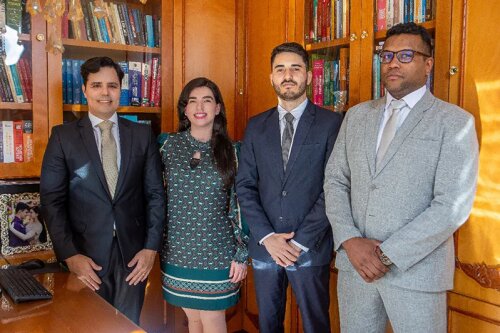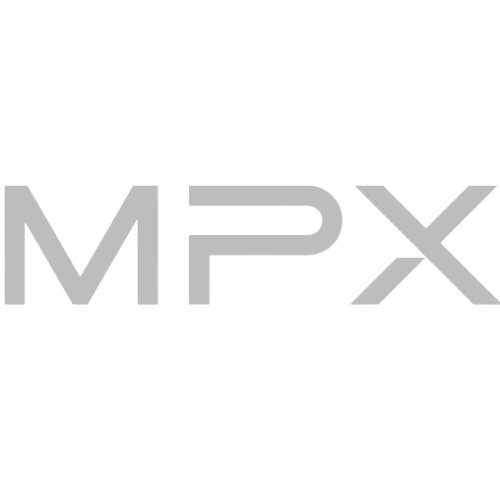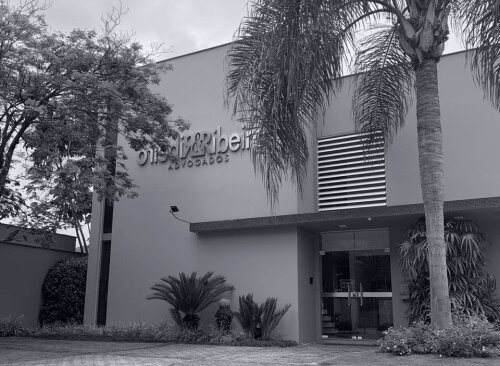Best Data Center & Digital Infrastructure Lawyers in Brazil
Share your needs with us, get contacted by law firms.
Free. Takes 2 min.
Or refine your search by selecting a city:
List of the best lawyers in Brazil
About Data Center & Digital Infrastructure Law in Brazil
Data Center and Digital Infrastructure law in Brazil is a growing field that reflects the country’s increasing digitalization and modernization. With Brazil being the largest economy in Latin America, the demand for reliable data storage, processing, and connectivity has soared. Legal frameworks surrounding data centers and digital infrastructure address not just technological issues, but also compliance, security, environmental impact, and investment regulations. These laws are shaped by advancements in cloud computing, Internet of Things (IoT), artificial intelligence, and Brazil’s commitments to international data protection and digitalization standards. Understanding these laws is crucial for anyone seeking to operate, invest in, or use digital infrastructure within Brazil.
Why You May Need a Lawyer
Legal assistance is often necessary in the field of Data Center and Digital Infrastructure for several reasons. Businesses and individuals may need help with:
- Negotiating and drafting contracts for data center construction or colocation agreements
- Ensuring compliance with Brazil’s data protection and privacy laws, including the Lei Geral de Proteção de Dados (LGPD)
- Handling disputes regarding land use or environmental licenses for building or expanding data centers
- Navigating import regulations for specialized IT equipment
- Responding to cyberattacks or managing cybersecurity obligations
- Acquiring necessary permits and licenses from local authorities
- Dealing with taxation issues specific to digital infrastructure assets and operations
- Addressing labor law issues for highly specialized staff working in data centers
- Structuring foreign investments or joint ventures in digital infrastructure projects
- Managing compliance with international standards and cross-border data transfers
Local Laws Overview
Brazil’s legal landscape for Data Center and Digital Infrastructure is shaped by a mix of sectoral, federal, and municipal regulations, as well as international commitments.
- Data Protection: The LGPD is Brazil’s comprehensive data privacy law, closely modeled after the European Union’s General Data Protection Regulation (GDPR). It governs how personal data must be collected, stored, processed, shared, and deleted.
- Infrastructure Regulation: The construction and operation of data centers are subject to licensing requirements, building codes, and often environmental regulations - especially for energy and water usage.
- Telecommunications Law: The Marco Civil da Internet (Internet Civil Rights Framework) lays out rules for online data neutrality, privacy, and the responsibilities of service providers.
- Cybersecurity: Brazil has specific laws addressing information security, and some sectors (such as finance and health) have stricter security and incident reporting obligations.
- Cross-border Data Transfers: The LGPD has strict requirements for transferring personal data outside Brazil, making it crucial for multinationals to plan data center locations accordingly.
- Taxation: There are specific tax implications and benefits for investments in technology and infrastructure under laws like the Lei do Bem and others.
- Labor Law: Labor relations, especially with highly technical staff, are regulated by the Consolidation of Labor Laws (CLT), with specific attention to working conditions, overtime, and workplace safety.
Frequently Asked Questions
What is the LGPD and how does it affect data centers?
The LGPD is Brazil’s General Data Protection Law. It applies to data centers by regulating how personal data is collected, stored, processed, and transferred, both within and outside Brazil.
Do data centers in Brazil need specific licenses or permits?
Yes, data centers usually require permits for construction, operation, and environmental compliance, depending on their size and location.
Are there restrictions on building data centers in certain areas?
Municipal zoning laws and environmental regulations can limit where data centers may be built, especially in protected areas or near residential neighborhoods.
Can foreign companies own or operate data centers in Brazil?
Foreign companies can own or operate data centers, but must comply with Brazilian regulations on foreign investment, local taxation, and sometimes require partnerships with local entities.
How are environmental concerns addressed in data center projects?
Environmental impact assessments and licenses are often required, especially for large facilities due to their water and electricity consumption.
What should be included in a data center service contract?
Contracts should cover service levels, security, liability, compliance with data law, maintenance, exit clauses, and disaster recovery measures.
How does taxation affect data center operations?
There are both incentives and taxes for data center operations, including on equipment imports, state-level VAT (ICMS), and incentives under technology innovation laws.
Who regulates telecommunication and internet infrastructure in Brazil?
The National Telecommunications Agency (ANATEL) oversees telecommunications, while other regulatory bodies address environmental, tax, and labor compliance.
What happens in case of a personal data breach?
Companies may need to notify regulators and affected individuals, face penalties, and implement corrective actions, in line with LGPD requirements.
Are there special rules for cross-border transfers of data hosted in Brazilian data centers?
Yes, the LGPD requires that data transferred abroad meets certain adequacy and protection standards, typically validated by Brazil’s data authority (ANPD).
Additional Resources
There are several resources and organizations that can help guide you through legal matters related to Data Center and Digital Infrastructure in Brazil:
- National Data Protection Authority (Autoridade Nacional de Proteção de Dados - ANPD)
- National Telecommunications Agency (Agência Nacional de Telecomunicações - ANATEL)
- National Information Technology Institute (Instituto Nacional de Tecnologia da Informação - ITI)
- Brazilian Chamber of Information Technology and Communication (Câmara Brasileira de Tecnologia da Informação e Comunicação)
- Local legal counsel specializing in technology, telecommunications, and data privacy
- Trade associations and professional organizations in cloud computing and infrastructure
Next Steps
If you require legal assistance with Data Center and Digital Infrastructure matters in Brazil, it is important to:
- Assess your needs - whether they relate to compliance, contracts, investments, or disputes
- Gather all relevant documents and information about your project or operation
- Research and contact a reputable Brazilian law firm or specialist with experience in digital infrastructure
- Prepare a list of specific questions or challenges that you hope to address with legal advice
- Stay updated on legal changes, as Brazil’s data and technology laws evolve rapidly
Consulting with a qualified lawyer will help you understand your rights and obligations, avoid common pitfalls, and ensure your operations are secure and compliant with Brazilian law.
Lawzana helps you find the best lawyers and law firms in Brazil through a curated and pre-screened list of qualified legal professionals. Our platform offers rankings and detailed profiles of attorneys and law firms, allowing you to compare based on practice areas, including Data Center & Digital Infrastructure, experience, and client feedback.
Each profile includes a description of the firm's areas of practice, client reviews, team members and partners, year of establishment, spoken languages, office locations, contact information, social media presence, and any published articles or resources. Most firms on our platform speak English and are experienced in both local and international legal matters.
Get a quote from top-rated law firms in Brazil — quickly, securely, and without unnecessary hassle.
Disclaimer:
The information provided on this page is for general informational purposes only and does not constitute legal advice. While we strive to ensure the accuracy and relevance of the content, legal information may change over time, and interpretations of the law can vary. You should always consult with a qualified legal professional for advice specific to your situation.
We disclaim all liability for actions taken or not taken based on the content of this page. If you believe any information is incorrect or outdated, please contact us, and we will review and update it where appropriate.
Browse data center & digital infrastructure law firms by city in Brazil
Refine your search by selecting a city.














